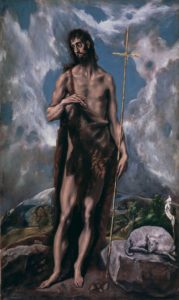
John the Baptist – El Greco, 16th c.
Luke 3: 1-6
In the fifteenth year of the Emperor Tiberias, when Pontius Pilate was governor of Judaea, when Herod was prince of Galilee, Herod’s brother Philip prince of Ituraea and Trachonitis, and Lysanias prince of Abilene, during the high-priesthood of Annas and Caiaphas, the word of God came to John son of Zechariah in the wilderness. And John went all over the Jordan valley proclaiming a baptism of repentance for the forgiveness of sins, as it is written in the book of the prophecies of Isaiah:
A voice crying aloud in the wilderness, “Prepare a way for the Lord; clear a straight path for him. Every ravine shall be filled in, and every mountain and hill leveled; the corners shall be straightened, and the rough ways made smooth; and all people shall see God’s deliverance.” Isaiah 40:3-5
Baptism: Was there baptism before John the Baptist? *
Thoughts on seeing the whole picture – Donna Ross
In a time of great social unrest, political turmoil, and desperate poverty alongside extreme wealth – a time not unlike our own time – John the Baptist comes with a renewed vision of life with God and neighbor. But to see that vision, all the obstacles need to be removed.
To clearly see the possibilities of a room, all the old furniture must be cleared away. What small things am I so used to that I can’t see past them to the bigger picture?
* Baptism:
In John the Baptist’s time the Essenes, an ascetic Jewish sect who had retreated to the desert, practiced daily ritual bathing; but ritual bathing was also quite common for ordinary Jews.
Natural lakes and rivers were regarded as the most desirable places for ritual bathing; but a cistern, a fountain, or a ritual bath (a mikveh) was also permitted. Archaeologists have discovered many ancient mikva’ot in Jerusalem – near synagogues and public places, but also in private homes.
The Law required ritual bathing whenever a person became unclean (see Leviticus 15); and by the time of John the Baptist ritual bathing had also become a traditional practice before entering the Jerusalem Temple. In Israel and throughout the Roman Empire, ritual bathing was also the final step for everyone converting to Judaism.
John the Baptist seems to have connected the ancient Jewish practice of ritual cleansing to his own call to baptism for the forgiveness of sins.
By the time of the early church, baptism was required for new Christians – now just as a sign of ritual cleansing, but as a sign of a person’s acceptance of Jesus as Messiah and Lord. (See Acts 8:36)
